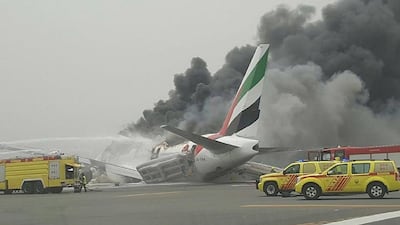The pilots of an Emirates flight that crash-landed in Dubai four years ago did not realise the plane's engines were idle when they attempted to abort a landing.
A report issued by the General Civil Aviation Authority on Thursday revealed there was not enough power in the engines of the Boeing 777 to lift the plane again. This caused the jet to crash into the tarmac as the pilots attempted a second landing.
The pilots chose not to land, after an initial touchdown, due to strong winds but the aircraft hit the runway as its landing gear was retracting.
Flight EK521, from Thiruvananthapuram in Kerala, India crashed at Dubai International Airport on August 3, 2016. All 300 passengers and crew survived. Thirty people were taken to hospital.
Nine minutes after the aircraft came to rest, the fuel tank exploded, killing firefighter Jassim Al Baloushi, 27, from Ras Al Khaimah.
On Thursday, the final report from the aviation authority said air-traffic controllers failed to warn the pilots that two planes ahead of Flight EK521 had been unable to land because of wind shear.
“The flight crew reliance on automation and lack of training in flying go-arounds from close to the runway surface … significantly affected the flight crew performance in a critical flight situation which was different to that experienced by them during their simulated training flights,” the report stated.
At least 15 passengers filed a lawsuit in the US against Boeing in 2017, claiming the crash was caused by an issue with the aircraft’s design.
A preliminary report from the General Civil Aviation Authority found that “analysis of the data downloaded indicates there were no aircraft systems or engine abnormalities up to the time of the accident”.
On Thursday, Emirates airline acknowledged the conclusions and recommendations in the final report by the UAE Air Accident Investigations.
“We would like to once again express our sorrow and convey our condolences to the family of the firefighter who lost his life while responding to the accident,” said a statement from Adel Al Redha, the chief operating officer of Emirates.
“Since the accident, our priorities have been to support the passengers and crew of EK521, to conduct a thorough review of our internal processes, and to support the work of the investigators,” he said.
“In addition to actions identified in the Final Report, Emirates has also proactively taken the appropriate steps to further enhance our operating procedures based on our own internal investigation, as well as on a thorough review of the Preliminary Report and Interim Report.”

